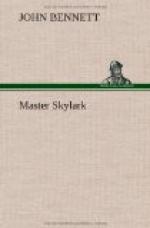“Ay, that they don’t! Why, hark ’e, Nick! This morning, since Sir Thomas has gone home, and the burgesses’ heads have all cooled down from the sack and the clary they were in last night, la! but they are in a pretty stew, my father says, for fear that they have given offense to the Lord Admiral. So they have spoken the master-player softly, and given him his freedom out of hand, and a long gold chain to twine about his cap, to mend the matter with, beside.”
“Whee-ew!” whistled Nick. “I wish I were a master-player!”
“Oh, but he will not be pleased, and says he will have his revenge on Stratford town if he must needs wait until the end of the world or go to the Indies after it. And he has had his breakfast served in Master Geoffrey Inchbold’s own room at the Swan, and swears that he will walk the whole way to Coventry sooner than straddle the horse that the burgesses have sent him to ride.”
“What! Is he at the inn? Why, let’s go down and see him.”
“Master Brunswood says that he will birch whoever cometh late,” objected Hal Saddler.
“Birch?” groaned Nick. “Why, he does nothing but birch! A fellow can na say his ‘sum, es, est’ without catching it. And as for getting through the ‘genitivo’ and ‘vocativo’ without a downright threshing—” He shrugged his shoulders ruefully as he remembered his unlearned lesson. Everything had gone wrong with him that morning, and the thought of the birching that he was sure to get was more than he could bear. “I will na stand it any longer—I’ll run away!”
Kit Sedgewick laughed ironically. “And when the skies fall we’ll catch sparrows, Nick Attwood,” said he. “Whither wilt thou run?”
Stung by his tone of ridicule, Nick out with the first thing that came into his head. “To Coventry, after the stage-players,” said he, defiantly.
The whole crowd gave an incredulous hoot.
Nick’s face flushed. To be crossed at home, to be birched at school, to work all May-day in the tannery vats, and to be laughed at—it was too much.
“Ye think that I will na? Well, I’ll show ye! ’Tis only eight miles to Warwick, and hardly more than that beyond—no walk at all; and Diccon Haggard, my mother’s cousin, lives in Coventry. So out upon your musty Latin—English is good enough for me this day! There’s bluebells blowing in the dingles, and cuckoo-buds no end. And while ye are all grinding at your old Aesop I shall be roaming over the hills wherever I please.”
As he spoke he thought of the dark, wainscoted walls of the school-room with their narrow little windows overhead, of the foul-smelling floors of the tannery in Southam’s lane, and his heart gave a great, rebellious leap. “Ay,” said he, exultantly, “I shall be out where the birds can sing and the grass is green, and I shall see the stage-play, while ye will be mewed up all day long in school, and have nothing but a beggarly morris and a farthing May-pole on the morrow.”




